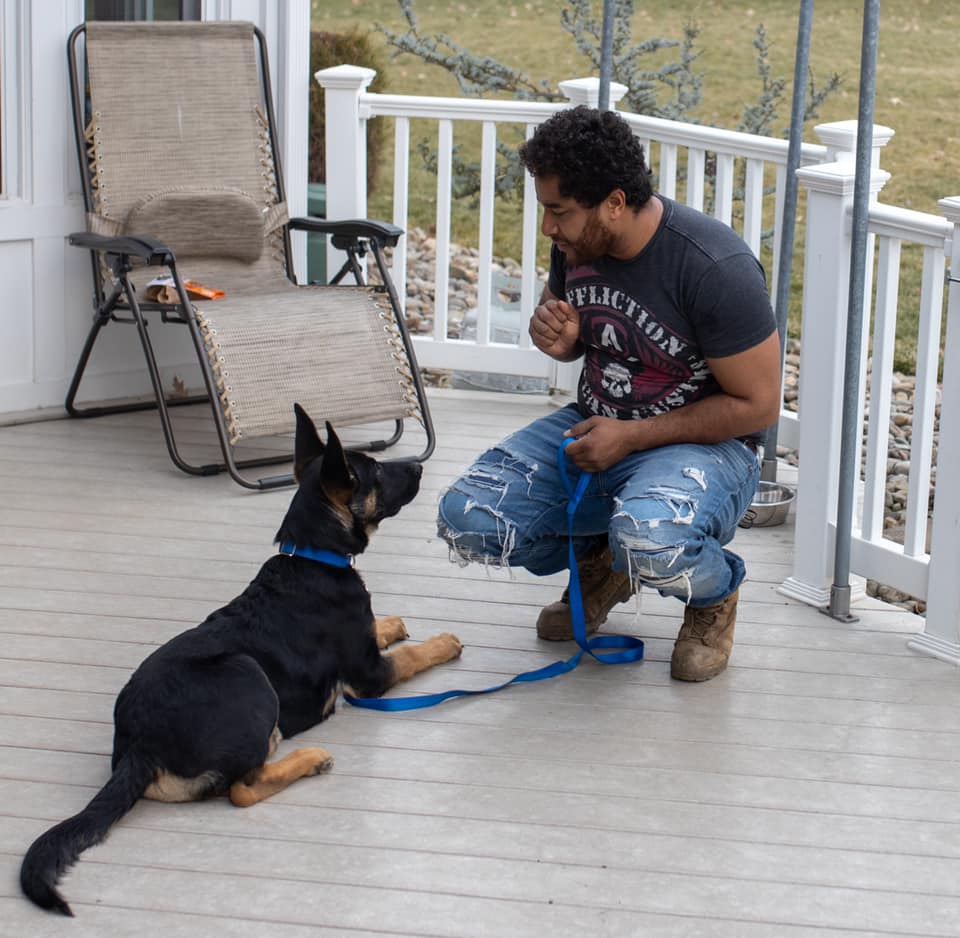Reliable Methods for Successful Pet Training: A Comprehensive Overview
Effective canine training requires a nuanced understanding of canine behavior. It depends upon the concepts of positive reinforcement and consistency. Fitness instructors need to recognize the significance of important commands and socializing. Dealing with common behavior concerns can transform a canine's personality. As the bond between proprietor and pet reinforces, the means they interact advances. The journey of effective training encompasses different approaches that might amaze also experienced pet dog owners. What are the crucial elements that can make a substantial distinction?
Recognizing Pooch Habits
Understanding canine habits is necessary for effective pet dog training, as it allows fitness instructors to translate a pet dog's actions and reactions in different circumstances. Dogs interact primarily via body language, articulations, and facial expressions. Acknowledging signs of tension, aggressiveness, or worry can assist instructors change their methods to guarantee a favorable training experience. A wagging tail does not always indicate happiness; the context and various other body signs need to be considered.
In addition, comprehending a pet's breed-specific characteristics can offer understandings into their habits patterns and impulses. Socialization plays a critical duty fit a canine's actions to brand-new people and atmospheres. Observing a canine's play style can also disclose their character and convenience levels. By carefully evaluating these habits, instructors can create customized techniques that cultivate discovering and reinforce the bond between canine and owner, inevitably resulting in even more successful training end results.
The Importance of Favorable Reinforcement
Favorable reinforcement is a crucial strategy in dog training that improves the discovering process by gratifying desired behaviors. This approach encourages dogs to repeat activities that generate positive end results, such as deals with, praise, or play (Dog Training Near Me). By linking great actions with incentives, pets come to be a lot more motivated and engaged throughout training sessions

Incorporating positive support right into training routines can result in quicker learning and much better retention of commands. It advertises a joyful ambience that boosts both the dog's experience and the instructor's complete satisfaction, making it an essential element of efficient dog training.
Important Commands Every Canine Need To Know

Developing a Consistent Training Arrange
Establishing a constant training routine is vital for efficient pet training, as it helps enhance discovering and develops a sense of routine for the canine. An organized approach permits both the instructor and the canine to prepare for training sessions, which can enhance emphasis and interaction. Preferably, training sessions should be short, long-term between 5 to 15 mins, to maintain the pet dog's attention and excitement.
Integrating training right into everyday activities, such as nourishment or strolls, can also promote uniformity. This combination helps canines link training with favorable experiences. It is crucial for instructors to remain adaptable; unforeseen occasions may require changes to the timetable.
Additionally, rep is essential. Regular method of commands and behaviors strengthens learning and constructs self-confidence. By adhering to a regular schedule, fitness instructors can assure that their pet dogs establish excellent practices and respond reliably to commands, laying the groundwork for efficient training end results.
Socialization: Key to a Well-Adjusted Pet
Socializing is essential for a dog's advancement, influencing their behavior and communications with individuals and other pets. Early direct exposure to numerous atmospheres, sounds, and experiences can significantly enhance a pet dog's flexibility and confidence. Using reliable socialization strategies can aid guarantee a well-adjusted canine friend.
Value of Very Early Socializing

Strategies for Reliable Socialization
While numerous dog owners acknowledge the value of socializing, understanding reliable strategies to promote this process is essential for promoting a well-adjusted pet dog. Progressive exposure to diverse settings, people, and various other animals can considerably boost a canine's convenience level in various circumstances. Favorable support plays a crucial duty; gratifying desired habits urges pet dogs to come close to new experiences with self-confidence. Structured playdates with well-mannered dogs assist reduce and establish social abilities fear actions. Signing up in obedience classes can likewise supply controlled atmospheres for socializing. Lastly, maintaining a calm demeanor as a proprietor strengthens the pet's complacency, enabling for more effective communications. These methods collectively add to a versatile and balanced canine buddy.
Managing Typical Behavioral Issues
Handling typical behavioral issues is necessary for keeping a harmonious connection between dogs and their proprietors. Secret obstacles such as hostility, extreme barking, and jumping behavior require targeted approaches to handle efficiently. Recognizing the source of these behaviors can lead to successful treatments and a more well balanced canine buddy.
Dealing With Aggression Issues
Hostility in pets can manifest in numerous kinds, posturing obstacles for trainers and owners alike. Dealing with these issues demands a detailed understanding of the underlying causes, which may consist of fear, source, or territoriality safeguarding. Determining triggers is crucial; proprietors must observe their pet dog's body movement and habits to pinpoint specific scenarios that provoke hostility. Positive support strategies can successfully customize aggressive actions, gratifying calm actions to identified triggers. Uniformity is key, and owners should stay patient throughout the training procedure. Sometimes, expert assistance from a licensed canine instructor or behaviorist may be required, specifically for extreme hostility. Eventually, the objective is to produce a secure setting for both the canine and those around it.
Taking Care Of Excessive Barking
Extreme barking can be a significant hassle for canine owners and neighbors alike, often signaling underlying issues that require attending to. Recognizing the triggers behind the barking is important; these may consist of boredom, anxiousness, or a reaction to outside stimulations. Proprietors need to observe their canine's habits and setting to identify the cause. Dog Training Near Me. Executing constant training strategies, such as positive reinforcement, can successfully lower barking. Teaching commands like "quiet" or rerouting the dog's interest right now of barking can be helpful. Furthermore, giving appropriate physical and mental stimulation through exercises and interactive playthings can reduce boredom-related best site barking. Sometimes, consulting a professional trainer or behaviorist may be necessary to create tailored approaches that address relentless barking problems
Lowering Leaping Behavior
Numerous dogs display leaping habits, commonly as a way of expressing exhilaration or looking for interest from their proprietors and visitors. This habits can be bothersome, especially when it results in unintended injuries or discomfort for visitors. To minimize jumping, owners ought to initially remain tranquil and prevent rewarding the habits with interest, as this can strengthen it. Rather, they can educate an alternative behavior, such as resting, by awarding the pet dog for remaining tranquility when someone strategies. Uniformity is crucial; all member of the family should apply the same regulations. Furthermore, training sessions must include diversions to help the canine find out to control their impulses. In time, with persistence and persistence, leaping can be significantly lowered, bring about an extra positive setting.
Building a Solid Bond With Educating
Training a dog frequently concentrates on actions and commands, it also serves as a vital chance to reinforce the bond in between the pet dog and its owner. Engaging in training sessions cultivates communication, good understanding, and trust. When proprietors invest time in instructing their dogs, they demonstrate commitment, which aids the dog feel safe and valued. Favorable pop over to this site support strategies, such as treats and appreciation, not just encourage preferred habits yet also enhance the psychological connection in between the pet and proprietor.
In addition, consistency in training constructs a feeling of reliability, allowing canines to recognize their function within the family. Each successful command boosts the dog's self-confidence, resulting in a deeper partnership. Normal training sessions can come to be satisfying bonding experiences, filled with playfulness and communication - Dog Training Near Me. Eventually, the process of training goes beyond simple obedience, developing a partnership that enhances the lives of both the pet dog and its proprietor
Frequently Asked Concerns
What Age Is Ideal to Start Training a Pup?
The very best age to start training a pup is usually in between 8 to 12 weeks. At this stage, puppies are most responsive to finding out, making it an excellent time for foundational training and socializing.
For how long Should Each Training Session Last?
The ideal duration for each and every pet training session normally ranges from 5 to 15 minutes, depending upon the dog's age and focus span. Short, focused sessions improve discovering and retention, making training more delightful and reliable.
Can Older Dogs Still Be Trained Successfully?
Older pet dogs can undoubtedly be educated properly. With perseverance and consistent techniques, they can find out brand-new commands and habits. Their experience often makes them more receptive to training, improving the bond in between pet and owner.
What Equipment Do I Required for Training?
For efficient pet training, crucial tools includes a sturdy leash, a comfortable harness, high-value treats, training clickers, and a selection of playthings. These devices assist in interaction and enhance positive behaviors during training sessions.
Exactly how Do I Track My Canine's Training Progress?
To track a pet dog's training development, one can maintain a journal, document milestones, and note behavior adjustments. Regular assessments, consisting of timed commands and obedience tests, help assess improvement and recognize areas needing further attention.
Comprehending canine habits is necessary for reliable canine training, as it allows trainers to interpret a canine's activities and responses in various circumstances. Developing a consistent training schedule is crucial for reliable dog training, as it aids enhance knowing and develops a sense of routine for the pet. Educating a pet typically concentrates on behaviors and commands, it additionally serves as a necessary possibility to strengthen the bond between the pet and its proprietor. When owners invest time in teaching their pets, they show dedication, which helps the dog really feel protected and valued. The suitable period for each pet dog training session generally varies from 5 to 15 mins, depending on the canine's age and focus span.